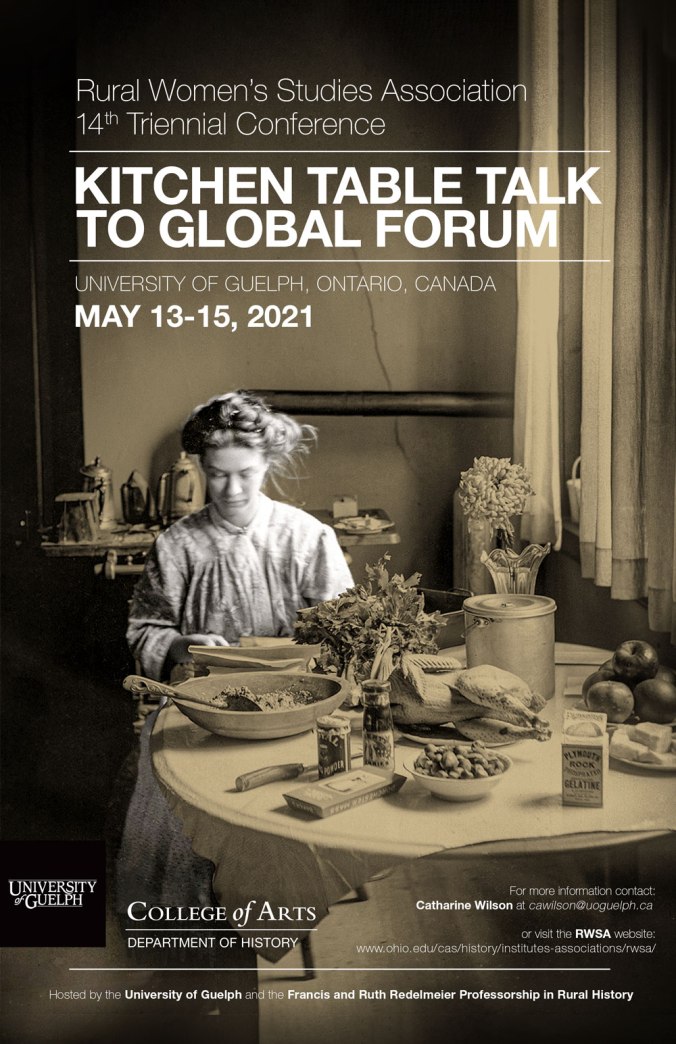At Mam-maw’s Table
Tracey Hanshew, Washington State University
Editor’s note: The Rural Women’s Studies Association is publishing a cookbook in conjunction with its 14th triennial conference in May 2021. Our cookbook will feature a wide variety of recipes accompanied by brief stories or commentaries, as well as longer interpretive essays on foodways. Today’s post is a sample of the goodies to come in this cookbook. It is re-blogged by permission from author Tracey Hanshew’s blog.
I am a member of a professional organization, the Rural Women’s Studies Association and this association has a conference centered on the theme of Kitchen Table Talk. When the theme was first introduced a flood of memories came to mind from my own grandmother’s kitchen table. I was fortunate enough to grow up in rural Texas with my grandparents as neighbors—just a field and some pasture in the mile between our homes.
She was a good cook, a fact that people commented on most of my life. When introduced to people who knew my grandparents, they would always say “I knew your grandma, she was a great cook!” So, I am not just partial in saying that she was. She rarely used recipes, and sometimes invented new casseroles or cakes; a family favorite was just called “Mam-maw’s Cake.” Her table was a welcoming place, always; and even when she would say, “we don’t have much today” there was always enough food for everyone and a few guests.

My favorite memories are of Sundays at Mam-maw’s kitchen table. Right after church we would all meet at her house. It wasn’t until I was older that I fully appreciated how early she had to get up to cook that meal so it was completely prepared before driving the five miles to town for church services, and somehow she magically kept it warmed (before microwaves) and without drying anything to cardboard stage while we were at Sunday school and church for usually around three hours total.
I have never been a morning person, but as a child staying with my grandparents, the day began just before sunrise. I would often hear them preparing breakfast in the kitchen—I have long been sure my Papa rattled silverware and clanked the dishes extra loud to wake me up—and I would try to lay in the bed just a bit longer watching the sun come up before stepping onto the sometimes cold wood floors. Breakfast, lunch, and supper were all cooked from scratch, so starting early was well worth it. Unlike today, the TV and radio were off during most meals, no eating in front of a TV, but if it was just the three of us, and breakfast was timed right we could have the radio on to Paul Harvey. His radio show, The Rest of the Story, that began from his work broadcasting during the second world war by 1976 had become a syndicated series that aired daily, Monday through Fridays. A conservative commentator, Harvey often gave us much to think about as we started the day. He seemed someone who could eloquently reach and relate to the rural communities where he was so popular.

Every meal at that table started with grace. Conversations then at Mam-maws table might be about the chores to do…which field needed plowing, when to put in something to the garden, checking on a “sick” cow, or taking food to a sick neighbor. Talk of news, the cattle market, and politics always seemed to carry over to the back porch which was adjacent to the kitchen table after they enclosed the porch to make it into a room. Reading newspapers, and Progressive Farmer, my grandparents stayed current on issues that directly affected all of us.

So, in thinking about the upcoming RWSA conference, my deeply nostalgic thoughts made me realize how much of my own foundation and values, nourished at Mam-maw’s table, led to my interest in the history of rural life and specifically to women’s role in it. The theme of this conference provides limitless opportunity for scholars in this field to explore the ways in which the center of homes across rural areas cultivated ideas, analyzed problems, raised leaders, and sometimes created change with national implications. I for one, am glad to have had a seat at this table.

